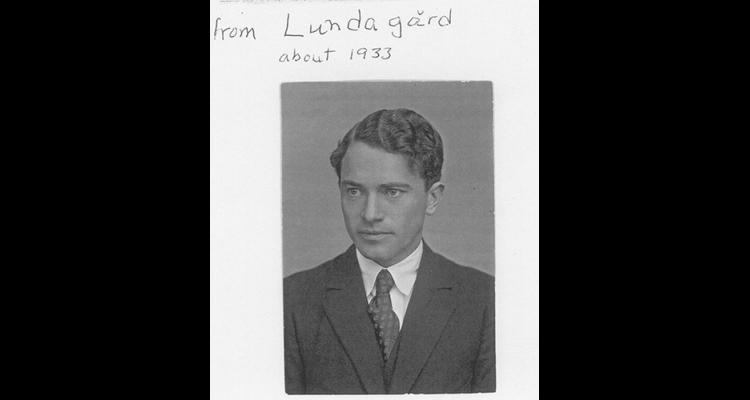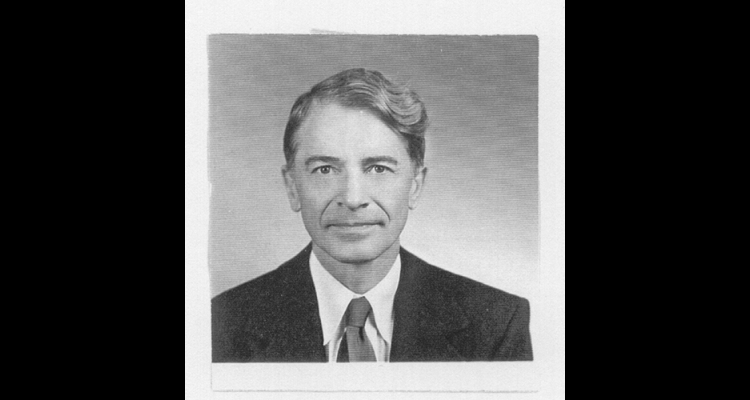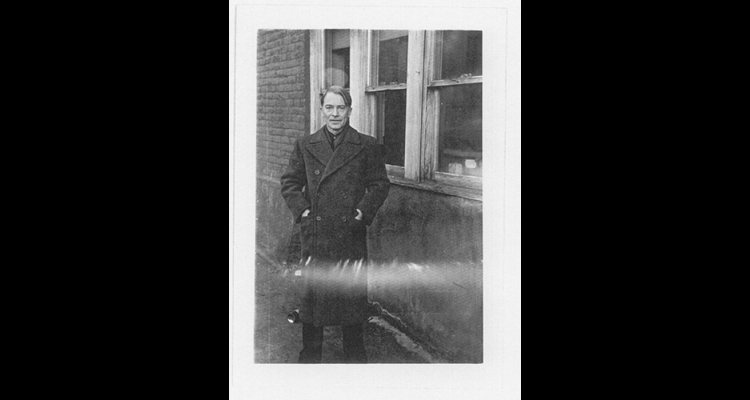Sven S. Liljeblad
Sven S. Liljeblad (1899-2000) was a prominent folklorist, linguist, and anthropologist who participated in an important chapter of Great Basin Native American studies beginning in the 1940s. Before his work in Nevada and Idaho, however, Liljeblad had already earned an international reputation for his pioneering research in European folklore.
Born in Jönköping in southern Sweden in 1899, Liljeblad earned his doctorate at Lund University in 1927 under the direction of famed folklorist, Carl Wilhelm von Sydow (the father of the actor, Max von Sydow). Liljeblad’s dissertation dealt with a complex of folktales involving the motif of the Grateful Dead. He and von Sydow intended the publication to be a vehicle to demonstrate a new approach to folklore studies, called the Oecotype or “Swedish” School.
The method of Liljeblad and von Sydow diverged from the older Finnish Historic Geographic method by placing greater emphasis on the geographic character of oral tradition rather than on its historic roots. Liljeblad drew inspiration from the work of Franz Boas (1858-1942) whose meticulous collection of Native American material considered geographic variations to understand the dynamics of culture. Similarly, the Oecotype School compared differences in oral tradition to material culture, including house and oven types, to define large zones of cultural patterns (distinct from language or political borders).
Liljeblad wrote extensively in the 1920s and 1930s, teaching at Lund until 1936. His research took him to Norway, Germany, Czechoslovakia, Finland, and Ireland, and he published in six languages before he was thirty. During the late 1920s, Liljeblad organized the Swedish folklore archive at Uppsala. He then used his experience to help establish the archive of the Department of Irish Folklore in Dublin in 1929.
In the early 1930s, Liljeblad mentored German folklorist, Elisabeth Hartmann, as she wrote her definitive study of Scandinavian troll beliefs, published in 1936. With the rise of Fascism in Germany during the 1930s, Liljeblad participated in an underground operating from Copenhagen, which rescued political dissidents and Jewish refugees from Nazi oppression. After a series of events that anticipated the outbreak of war, Hartmann was summoned home, and Liljeblad’s position became precarious. Upon winning an Anders Zorn fellowship from the Swedish-American Foundation, Liljeblad came to the United States in 1939.
Initially, Liljeblad went to the University of California at Berkeley to work with Robert Lowie and A. L. Kroeber. They suggested that the Swedish scholar’s abilities might be best applied to the recordation of Northern Paiute, Bannock, and Shoshone oral traditions and language. After an initial foray into the Great Basin, Liljeblad participated in the war effort by teaching European culture and languages, including Finnish and Russian, to United States military personnel. In 1945, he accepted a two-year appointment at Harvard, where he met Astrid von Heijne (1909-2010), who became his wife in 1949. Other academic affiliations included appointments at Indiana University and the University of Chicago.
Liljeblad returned to the Great Basin in the late 1940s, initially taking a professorship at Idaho State University, Pocatello and then conducting work at the University of Nevada, Reno. At the latter, Liljeblad accepted the position of Hilliard Distinguished Professorship in 1976, a position he retained until 1983. His extensive work in Great Basin linguistics and traditions became a cornerstone of articles that appear in the Smithsonian, Handbook of North American Indians, Volume 11: Great Basin, and his work also survives in a dictionary compiled by Catherine Fowler, The Northern Paiute-Bannock Dictionary, which draws on Liljeblad’s research.
Liljeblad’s work in the Great Basin spanned five decades. His legacy includes one of the largest collections of Northern Paiute, Bannock, and Shoshone language and oral tradition. Liljeblad worked at a pivotal time when much would have been lost had he not recorded people throughout the region.
Before returning to Sweden in 1991, Liljeblad donated his extensive research material to the Special Collections Library at the University of Nevada, Reno. He and Astrid also established the Liljeblad Endowment at the University of Nevada, Reno, to help fund research into linguistics and folklore. In 1991, Liljeblad became the second winner of the Michael Prize at the Ljungby Oral Story Festival in Sweden, an award given to a promoter of the study of oral traditions. In 1992, he was recognized as an Honorary Member of the Shoshone Paiute Tribes at the Duck Valley Reservation in Owyhee, Nevada. Earlier, in 1979, Nevada Humanities commissioned the renowned anthropologist Clifford Geertz to give a lecture in recognition of Liljeblad’s career and achievements. These are only three of the many honors bestowed on the Swedish scholar.
Sven Liljeblad died in Sweden on March 17, 2000, two months short of his 101st birthday.
Article Locations
Related Articles
None at this time.





